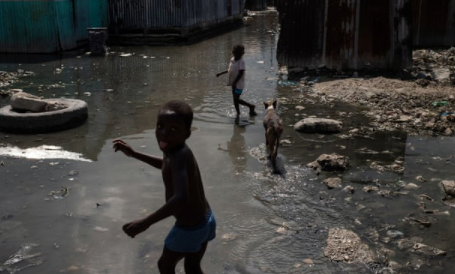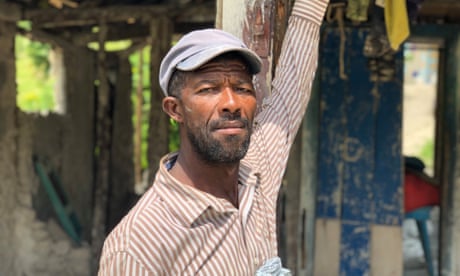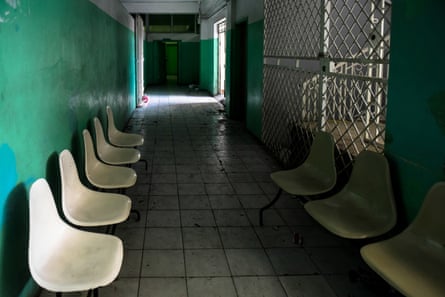In a country beset by violence, water and fuel shortages have closed healthcare facilities and allowed the disease to re-emerge

Thu 6 Oct 2022 01.00 EDT
Engulfed in gang violence and a series of acute humanitarian crises as hospitals are forced to close, Haiti has now been hit by a new outbreak of cholera.
At least eight people have died in the past few days, Haiti’s public health and population ministry said on Sunday. Thousands died in the last big cholera outbreak in the country in 2010.
More cases of the waterborne disease are likely to be circulating undetected in the gang-run slums, the World Health Organization said.
“The situation is evolving rapidly,” WHO spokesperson Christian Lindmeier told a UN media briefing in Geneva this week. “It is possible earlier cases have been undetected.”
The 2010 cholera outbreak, that infected 820,000 people and killed 10,000, lasted until January 2019 when the country reported its last infection.
Just as Haiti was close to being certified cholera-free – which requires no new confirmed cases in three years – the bacterial disease is back.
Eradicating cholera this time will be more difficult due to the myriad crises which will enable the illness’s spread, say medical experts in the capital, Port-au-Prince.
Gang violence swept the city after the assassination of president Jovenel Moïse in July 2021 and is exacerbating existing crises, such as malnutrition and a lack of basic supplies.

More than 1 million people in the capital are going hungry, water is increasingly scarce and in the last week fuel shortages have forced hospitals to close.
All cholera cases confirmed so far have occurred in the slums of Cité Soleil and Carrefour Feuilles – areas controlled by armed gangs.
“Access to these areas has been very difficult since the end of July 2022 and the situation in Haiti has worsened over the past three weeks with blockades, fuel shortages, protest marches, looting and general strikes. These factors fuel the humanitarian crisis and hamper response efforts,” Lindmeier said.
People contract cholera through contaminated food or water, and the collapse of basic services across Haiti has allowed it to return, said Judes Jonathas, who manages NGO Mercy Corps’ Haiti programme.
Water – for a long time scarce in Haiti’s mega-slums – has become increasingly precious in recent months. Armed groups will not let water trucks into areas they control and where water pipes reach, pumps are failing because of fuel shortages.
“The structures which should normally respond quickly to this problem are on their knees,” Jonathas said.

At least 70 patients have been hospitalised in Médecins Sans Frontières (MSF) treatment centres with acute diarrhoea, a common cholera symptom, the NGO’s deputy head of mission in Haiti, Moha Zemrag, told the Guardian.
The fatality rate for cholera is less than 1% when simple treatments such as rehydration salts can be used, according to WHO.
But in Haiti most of the country’s hospitals depend on generators run on fuel for power as the electricity grid is prone to outages, and gangs have blockaded the main fuel terminal.
Three-quarters of the nation’s main hospitals are either reducing their operations or closing their doors, Unicef said on 26 September.

“This resurgence of cholera is taking place at a time when Haitian people face enormous difficulties in accessing healthcare,” said MSF in a statement on the outbreak. “Insecurity and violence, coupled with severe shortages of fuel and drinking water, have forced many health facilities to reduce their activities and in some cases to stop them altogether. In addition to this, people who need treatment find it increasingly difficult to move around as public transportation is scarcely available due to a lack of fuel in the country.”
Zemrag said he was hearing of people dying at home because they cannot reach hospitals, “because there are no hospitals, or because people do not think of going quickly to health centres”.

WHO and its partner organisations are distributing medicine and equipment in Port-au-Prince. It is also setting up cholera treatment centres, increasing the capacity for disinfection efforts to contain the spread of the disease and requesting vaccines from the International Coordinating Group on Vaccine Provision.
Efforts to contain the outbreak will be hindered by a lack of trust of outsiders after a series of scandals involving UN peacekeepers, and a febrile political atmosphere.
UN peacekeepers in Haiti, accused of carrying out systematic sexual abuse of women, were found to have introduced the previous cholera outbreak by dumping contaminated sewage into a river.
False rumours are spreading throughout Haiti that the latest outbreak is a conspiracy by the government to deflect attention away from recent protests, Jonathas says.
“Government intervention in these neighbourhoods is already complicated. Now, unfortunately, some political activists are talking about cholera being a government strategy to create a diversion,” he said.